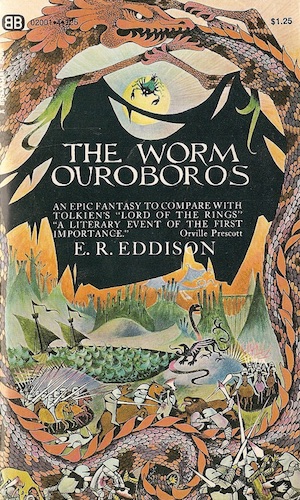Classics Club Book #14: The Worm Ouroboros by E.R. Eddison

Abase thee and serve me, worm of the pit. Else will I by and by summon out of ancient night intelligences and dominations mightier far than thou, and they shall serve my ends, and thee shall they chain with chains of quenchless fire and drag thee from torment to torment through the deep.
The Worm Ouroboros might be called world-building fantasy in the tradition of The Lord of the Rings but for two details: it was published 22 years before Tolkien’s trilogy, and it is much darker. In fact, though Tolkien himself called Eddison “the greatest and most convincing writer of ‘invented worlds’ that I have read,” he also said Eddison “was certainly not an ‘influence.'” The Worm Ouroboros definitely deserves its place in Moorcock’s Fantasy: The 100 Best Books, and there were moments in the book that really captivated me, but overall it took quite an effort to finish the book.
Part of the problem for me was the Elizabethan prose Eddison employed, and part of it was the fact that I could not get used to the names of the characters and the lands. It’s not that I couldn’t pronounce the names, but rather that they seemed so arbitrary and disconnected, invented with little thought: Juss, Spitfire, Goldry Bluszco, Gro, and Gorice, for example. And none of them interested me as people. Most of them seemed small-minded and petty.
The names of the lands, too, seemed to be arbitrary. They certainly had little to do with the inhabitants. Demons do not dwell in Eddison’s Demonland, nor do witches dwell in Witchland, imps in Impland, or pixies in Pixyland.
Still, all criticism aside, I’m glad I read The Worm Ouroboros, and not just for historical or academic reasons. It was adventurous, imaginative, and well-told. It is a flawed fantasy classic, but still a classic. Here is what Tolkien himself had to say about it, in a letter to Caroline Everette, dated June 24, 1957:
I read the works of Eddison, long after they appeared; and I once met him. I heard him in Mr. Lewis’s room in Magdalen College read aloud some of his works–from the Mistress of Mistresses, as far as I remember. He did it extremely well. I read his works with great enjoyment for their sheer literary merit. My opinion of them is almost the same as that expressed by Mr. Lewis on p. 104 of the Essays presented to Charles Williams. Except that I disliked his characters (always excepting the Lord Gro) and despised what he appeared to admire more intensely than Mr. Lewis at any rate saw fit to say of himself. Eddison thought what I admire ‘soft’ (his word: one of complete condemnation, I gathered); I thought that, corrupted by an evil and indeed silly ‘philosophy’, he was coming to admire, more and more, arrogance and cruelty. Incidentally, I thought his nomenclature slipshod and often inept. In spite of all of which, I still think of him as the greatest and most convincing writer of ‘invented worlds’ that I have read. But he was certainly not an ‘influence’.1
Eddison may not have influenced Tolkien, but I think you can certainly see his mark on dark fantasy characters like Conan the Barbarian, Fafhrd and the Gray Mouser, and Elric of Melniboné, not to mention more modern works of dark fantasy like Martin’s Game of Thrones or King’s Dark Tower series. If you’re a fan of any of those characters or works, then The Worm Ouroboros is a must read.
The Worm Ouroboros by E.R. Eddison
First edition London: Jonathan Cape, 1922
Kindle edition Open Road Media, 2014
Print length: 520 pages
1 Tolkien, J R. R, Humphrey Carpenter, and Christopher Tolkien. The Letters of J.R.R. Tolkien. Boston: Houghton Mifflin, 1981.
































Thanks for linking your review to the British Books Challenge Nick